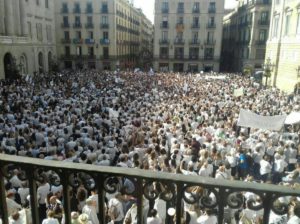‘Plague’ On sale now £9.99
Tags
Follow J.J.Anderson on Facebook
Follow J.J.Anderson on Pinterest
Archives
-
Recent Posts
Categories
http://www.thestorybazaar.com/rss.xml
Social
-
Privacy & Cookies: This site uses cookies. By continuing to use this website, you agree to their use.
To find out more, including how to control cookies, see here: Cookie Policy
A feast for the imagination


 RSS – Posts
RSS – Posts
White
Today (Sunday) there are marches in Catalonia, organised by the Societat Civil Catalana, against independence. Again, thousands take to the streets of Barcelona, this time to protest their desire to remain part of Spain. This comes amidst coverage of views from some Catalans that they feel intimidated by the separatists and are ‘called fascists’ if they disagree ( though there probably are some fascistic supporters of the anti-secessionist cause, nothing in regard to this situation is simple ). To an extent, I am reminded of the views expressed during the recent Scottish referendum, by those who wished to remain in the Union. They were, they claimed, the ‘silent majority’ but who did not feel comfortable speaking out. As it turned out, they were right and the majority of Scots did not want independence.
Again, thousands take to the streets of Barcelona, this time to protest their desire to remain part of Spain. This comes amidst coverage of views from some Catalans that they feel intimidated by the separatists and are ‘called fascists’ if they disagree ( though there probably are some fascistic supporters of the anti-secessionist cause, nothing in regard to this situation is simple ). To an extent, I am reminded of the views expressed during the recent Scottish referendum, by those who wished to remain in the Union. They were, they claimed, the ‘silent majority’ but who did not feel comfortable speaking out. As it turned out, they were right and the majority of Scots did not want independence.
They did want a better deal however and that is what could be offered to the Catalans. Catalonia has much autonomy, with its own Police force and domestic powers ( and it keeps much of its tax revenue, although it is a net contributor overall and is one of the economic powerhouses of Spain ). It does not have the degree of financial control that it wants ( and the Basque country has more, so there is a precedent in Spain for increasing Catalonia’s fiscal powers ). As part of its austerity measures the government of then PM Mariano Rajoy blocked greater Catalonian fiscal autonomy just after the financial crash.
Basque country has more, so there is a precedent in Spain for increasing Catalonia’s fiscal powers ). As part of its austerity measures the government of then PM Mariano Rajoy blocked greater Catalonian fiscal autonomy just after the financial crash.
So, why isn’t this option seen as a possible way out of the crisis?
I don’t know the answer to that question, but suspect it has something to do with each side being in weak positions, posturing as if they were strong and then finding that they have painted themselves into a corner.
The PP is a minority government, it only achieved power after eighteen months of deal brokering and two inconclusive national elections ( see the Hello, Prime Minister we need to talk….. thread of articles ). Their base is right wing, but probably insufficiently large to give them an overall majority in the Cortes if the other parties didn’t split the rest of the vote. The PP blocked greater Catalonian fiscal independence before.
So they are both leaders who occupy entrenched, but weak, positions. What happens next?
Well, Rajoy could invoke Section 155 of the Constitution, which has never been invoked before. This would, legally, suspend autonomy in the region, taking it fully back under central government control. Puigdemont could declare UDI (though this would be treated as illegal and, probably, prompt S155). Meanwhile, in Catalonia, Banco Sabadell, Spain’s third largest bank, has announced a re-location of their Barcelona headquarters and there is dissension in the Catalan Police force about what the right course of action is. Some commentators suggest that, if Puigdemont does not force his hand, Rajoy will do what he is good at and just wait.
Watch this space…..
Other articles about Spanish politics are Homage to Catalonia Who Rules Spain? Erm…..? Democracy III So what happened next?
Share this:
Posted on 9th October 2017 by juliej Leave a comment
This entry was posted in Political comment. Bookmark the permalink.